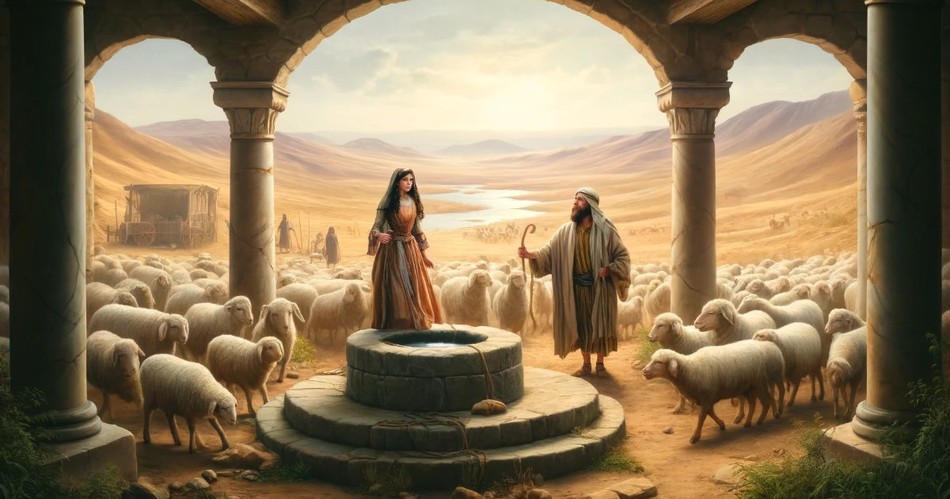Rachel is an influential figure in the Bible, primarily known from the Book of Genesis. She was the younger daughter of Laban, the sister of Leah, and the favored wife of Jacob, who was one of the patriarchs of the Israelites.
Discover how Rachel is interwoven with themes of love, envy, and the Israelite lineage as we explore her Bible story below.
Rachel's Early Life and Marriage
Rachel's story begins when Jacob arrives at her father Laban's household in Haran, seeking refuge from his brother Esau's wrath (Genesis 29). Upon meeting Rachel at a well, where she was watering sheep, Jacob is immediately smitten by her beauty and agrees to work for Laban for seven years in exchange for Rachel’s hand in marriage (Genesis 29:10-18).
However, Laban deceives Jacob, substituting Leah, Rachel’s older sister, on the wedding night. When Jacob confronts Laban about this deceit, Laban explains that it is not customary to marry off the younger daughter before the older one. Jacob then agrees to work another seven years for Rachel, demonstrating his deep love for her (Genesis 29:25-27).
Rachel's married life was marked by her rivalry with Leah, who was able to bear children while Rachel remained barren for a significant period. This rivalry reflects the intense desire for children, seen as a divine blessing and crucial for social status.
In her distress, Rachel says to Jacob, "Give me children, or I shall die!" (Genesis 30:1). Subsequently, she offers her maid Bilhah to Jacob as a surrogate, through whom Bilhah bears two sons, Dan and Naphtali (Genesis 30:3-8).
Birth of Joseph and Benjamin
Rachel's longing for her own children is finally fulfilled when she conceives and gives birth to Joseph, saying, "God has taken away my reproach" (Genesis 30:23). Joseph becomes Jacob's favorite son, which sows seeds of discord among his brothers.
Rachel later bears a second son, Benjamin, but tragically dies during childbirth. As she dies, she names him Ben-oni, meaning "son of my sorrow," though Jacob calls him Benjamin, meaning "son of the right hand" (Genesis 35:18). Rachel is buried on the way to Ephrath (Bethlehem), and Jacob sets a pillar upon her grave, known as Rachel's Tomb.
So Rachel died and was buried on the way to Ephrath (that is, Bethlehem). Over her tomb Jacob set up a pillar, and to this day that pillar marks Rachel’s tomb. (Genesis 35:19-20).
Read more: Bible Story of Joseph: Verses and Meaning
Rachel's Legacy
Rachel's legacy is poignant in the biblical narrative. She is portrayed as a figure of enduring love and tragic loss, her life reflecting the complexities of familial relationships and the deep desire for children. In Jewish tradition, Rachel is remembered as a symbol of the suffering and resilience of her descendants, especially during times of exile and hardship. Jeremiah references her as a mother weeping for her children, an emblem of hope and divine promise for the future redemption of Israel (Jeremiah 31:15-17).
Importance of Rachel in the Bible
Rachel holds a place of significant importance in the Bible, reflected through her influence on the lineage of Israel and her symbolic role in Jewish tradition. She is central to the narrative of Jacob's family and the development of the tribes of Israel, as her sons, Joseph and Benjamin, become two of the twelve tribes (Genesis 35:24).
Joseph's role is particularly crucial; he rises to become the vizier of Egypt, saving his family and many others during a severe famine (Genesis 41:39-57). This establishes the presence of the Israelites in Egypt, setting the stage for the subsequent Exodus.
Moreover, Rachel's personal struggles with infertility and her deep desire for children resonate with many. Her plea, "Give me children, or I shall die!" (Genesis 30:1), and her joy at the birth of Joseph, "God has taken away my reproach" (Genesis 30:23), underscore her profound emotional and spiritual investment in motherhood. These moments highlight the biblical themes of faith and divine intervention.
Rachel's death and her burial near Bethlehem also carry deep symbolic significance. She is mourned by Jacob, who marks her grave with a pillar, a testament to her lasting impact (Genesis 35:19-20). In Jewish tradition, Rachel is remembered as a compassionate figure, symbolic of the mother who mourns and intercedes for her children. This imagery is powerfully captured in the Book of Jeremiah, where Rachel is seen weeping for her children during the Babylonian Exile, a poignant expression of hope for their future return and redemption:
This is what the LORD says: “A voice is heard in Ramah, mourning and great weeping, Rachel weeping for her children and refusing to be comforted, because they are no more.” This is what the LORD says: “Restrain your voice from weeping and your eyes from tears, for your work will be rewarded,” declares the LORD. “They will return from the land of the enemy. So there is hope for your descendants,” declares the LORD. “Your children will return to their own land. (Jeremiah 31:15-17).
Rachel holds great significance in the Bible for various reasons. As the Israelites' literal and spiritual ancestor, she is an example of maternal devotion. Her story also represents hope and endurance in times of suffering. Her tale is an integral part of biblical history and Jewish religious identity.
Christianity.com's editorial staff is a team of writers with a background in the Christian faith and writing experience. We work to create relevant, inspiring content for our audience and update timely articles as necessary.
This article is part of our People of Christianity catalog that features the stories, meaning, and significance of well-known people from the Bible and history. Here are some of the most popular articles for knowing important figures in Christianity:
How Did the Apostle Paul Die?
Who are the Nicolaitans in Revelation?
Who Was Deborah in the Bible?
Who Was Moses in the Bible?
King Solomon's Story in the Bible
Who Was Lot's Wife in the Bible?
Who Was Jezebel in the Bible?
Who Was the Prodigal Son?




.jpg)